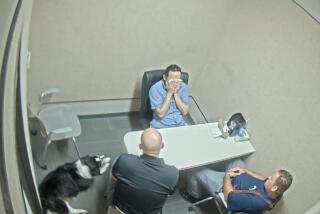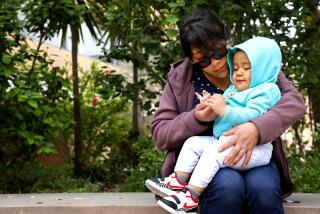Victim’s Kin Not Allowed to Claim Body : Requirement for Parental Permission Upsets Relatives
- Share via
A day after Juan Pedro Trujillo was gunned down on the Santa Ana Freeway at the wheel of his truck, his relatives said Monday that they are frustrated by the coroner’s refusal to allow them to view the body or to bury Trujillo without permission from his parents, who live in a remote village in central Mexico.
Family members, who say they have no explanation of the random violence that claimed Trujillo’s life, are eager to get on with the business of burying the 22-year-old Anaheim man who had dreams of becoming a mechanic.
But instead of spending their time grieving, the family has become frustrated and increasingly bitter by the confusing bureaucracy involved in the criminal investigation into Trujillo’s slaying.
Rounds From Assault Rifle
Trujillo died early Sunday at UCI Medical Center in Orange after someone in a car fired several rounds from a semiautomatic assault rifle at his truck. Trujillo, his brother and a cousin were returning home from a restaurant about 3:45 a.m. when the incident occurred neared the northbound Chapman Avenue exit in Orange. The two passengers in the truck were not injured.
Despite dozens of tips, police said they had no leads and were continuing to look for a blue Oldsmobile Cutlass they believe was involved in the shooting.
Since Trujillo’s death, the family has been unable to view the body or find out when they will be able to retrieve it for burial.
‘Coroner’s Standards’
“I think we have a right to see him, at least his brothers and sisters,” said Juan Zaragoza, who is married to Trujillo’s sister Carmen. “Imagine what they are suffering.”
Ron Stanzak, a coroner’s office supervisor, said the body would be released only to the next of kin, in this case Trujillo’s parents, who are in Mexico.
“This is coroner’s standards,” he said. “They can fax in a release or have it telegrammed. We will not release the body to his brother and sisters. They are not next of kin.
“This is not unusual,” Stanzak said. “We handle cases like this all the time. The parents don’t have to travel. All we ask for is a letter to release the body. I’m sure there’s a way for a letter or a telegram to get through.”
But family members, who do not speak English, said the matter is not so simple.
Trujillo’s parents live in the tiny village of El Juamuhil in the central Mexican state of Jalisco, which is little more than a collection of farms without the most basic public services. There are no paved roads or telephones, much less a fax machine or telegraph service.
Zaragoza said the family called cousins in the nearby town of La Barca Jalisco, where there is telegraph service, but that they would have to travel across dirt roads to get to the village. That may be difficult because this is the rainy season in that part of the country and the roads are virtually impassable, Zaragoza said.
“My cousin said they would try to somehow get a tractor to see if they could go and notify Juan Pedro’s parents about his death,” Zaragoza said. “His parents are old now, and I don’t think they can come. Imagine the blow this is going to be for them.”
Money Sent Home
Family members said Trujillo’s parents live off the money their children send back from their jobs in Orange County. Trujillo had worked at Big O Tires in Santa Ana and lived with his sister and her family in Anaheim. He was single and had no children.
Following the shooting on Sunday, Zaragoza went to UCI Medical Center where his brother-in-law had been taken and pronounced dead. Zaragoza then returned home to break the news to the family. But when they returned to the hospital, they were told that Trujillo’s body had been taken to the coroner’s office.
“Why did they move body from the hospital to the coroner’s without telling us?” Zaragoza said. “He is not like a rock that can be moved from place to place with no one interested in what happens to it.”
“I frankly do not understand why they do that,” he said. “The least they could have done was to let us know. They had our telephone number. . . . I just don’t think that this is right.”
Once at the coroner’s office, they found it locked. When they knocked, no one answered. Frustrated, they asked an officer in a nearby police car for help.
“The officer called from his car, and got someone to open the door for us,” Zaragoza said.
Zaragoza said the man who answered the door identified himself as William King, supervising investigator in the coroner’s office, but he told them they could not view the body.
‘Had to Run Tests’
“They would not let us in, they only spoke to us at the doorway,” Zaragoza said. “They said he was there but we couldn’t see him until Tuesday afternoon, or Wednesday, because they had to run a lot of tests.”
Sgt. Scott Stanton, a city of Orange police watch commander, said that he sympathized with the family but that it is the job of the coroner’s office to notify the family about the body being transferred and to make the decision when the body can be released.
“I can understand” the family’s frustration, he said.
Zaragoza said the experience had been a difficult one for the family.
“We are people who have to work for a living,” he said. “We don’t have time or money to move around from place to place looking for our relative. We are trying to take care of this as cheaply as possible, because we are poor people, but it seems a bit hard for us that this sheriff’s office tells us we cannot have our brother.”
Times staff writer Lily Eng contributed to this report.
More to Read
Sign up for Essential California
The most important California stories and recommendations in your inbox every morning.
You may occasionally receive promotional content from the Los Angeles Times.









